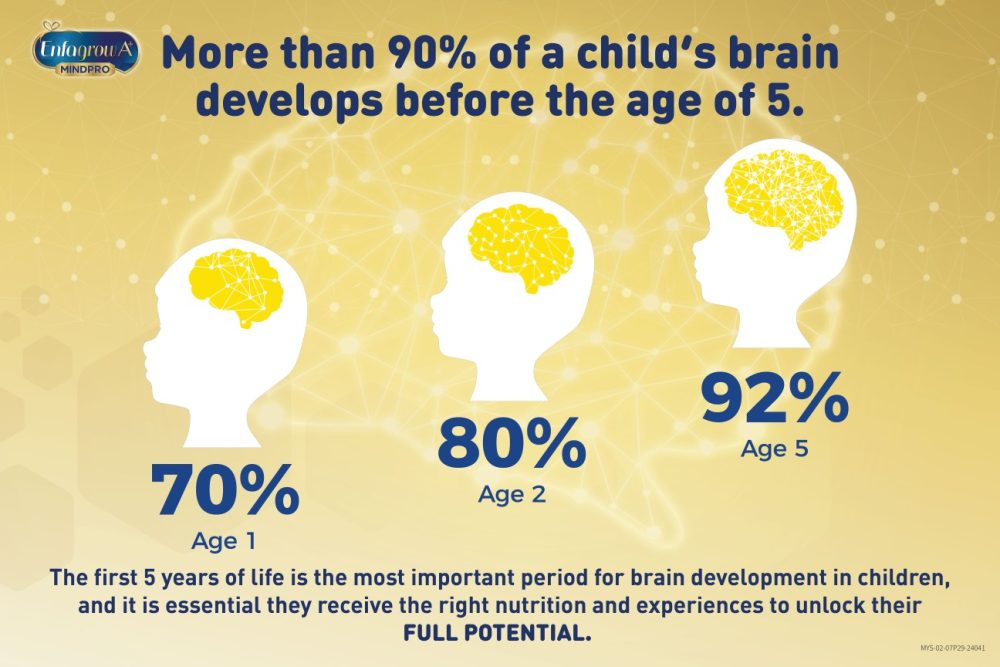In the whirlwind of parenting, it’s easy to get caught up in the daily routines of caring for a young child, especially during the important first five years. These early years are filled with rapid physical growth and incredible brain development, which all lay the foundation for your child’s cognitive and emotional future.
However, there is a growing concern about developmental delays among children in Malaysia. A recent report reveals that 7.4% of Malaysian children aged 12 to 59 months face developmental delays, with social delays being the most prevalent among the major domains, including cognitive, physical, language, and social-personal delays in 2022[i]. This number has nearly doubled in six years from 1.2% in 2016[ii].
This concerning increase underscores the urgent need to enhance developmental support for Malaysian children; it has become increasingly clear that nutrition and identifying and monitoring the child’s developmental progress are equally important during these formative years, ensuring that every children has the best possible start in life.
Professor John Colombo at the University of Kansas and an expert in neurocognitive development, particularly in early childhood has conducted research that emphasizes the profound importance of nutrition during the early years of life, what essential nutrients are especially important for neurodevelopment, and the importance of identifying and monitoring the child’s developmental progress in these years so that any potential delays can be identified and addressed as early as possible.
Why Early Neurodevelopment Development and Screening Matter
The first five years of life are often called a “critical period” for brain development; the first thousand days appear to be particularly significant, where 80% – 90% of the connections in the brain that will serve the child’s cognitive development are made. During this period, the brain undergoes rapid growth and changes that affect a child’s cognitive abilities and behavior[iii].
“In early childhood, the precursors of academic and social skills emerge as the brain’s frontal cortex matures. This development continues into early adulthood, influencing behavior, decision-making, and reasoning. This is why nutrition that includes essential nutrition is vital during this time. It helps support the brain’s growth and function,” explains Professor Colombo.
Essential Nutrition to Support Brain Development
Professor Colombo is known the conduct of many clinical trials on the impact of nutrients and micronutrients on cognitive development in children. His recent research involves Milk Fat Globule Membrane (MFGM), a collection of bioactive compounds crucial for brain development. This work has shown significant improvements in intelligence (IQ), and language, and executive function. Colombo explains that, “Executive functions involve attending to changing situations, remembering past responses, and making appropriate decisions based on this information. These are critical skills not just in school, but in life.”
He summarizes his most recent findings in saying that, “MFGM was found to be linked to enhanced executive functions essential for decision-making and academic success beyond 5.5 years.”

He goes on to state that “MFGM contributes to the development of myelin, which is crucial for efficient brain function. It also aids in neural signalling, which is essential for connectivity and communication among neurons in the brain. These processes are fundamental for a child’s cognitive abilities and behavioural responses.”
In simpler terms, think of myelin as the insulation around electrical wires. Just as insulation helps electricity flow smoothly without short-circuiting, myelin ensures brain signals travel quickly and efficiently, boosting a child’s ability to think, learn, and adapt[iv].
For parents, ensuring their children get the right nutrients can profoundly impact their ability to think critically, solve problems, and adapt to new challenges—increasingly important skills in our fast-paced world.
How Parents Can Help Support a Child’s Overall Growth and Development
Beyond proper nutrition, creating a stimulating, responsive, and emotionally positive environment is equally crucial for children’s brain development. A supportive and nurturing relationship between parents and children is also the key to obtaining positive neurodevelopment outcomes, as children may feel emotionally secure, increasing the likelihood of resilience and cognitive abilities development needed for future success[v].
Professor Colombo emphasizes the importance of fostering children’s cognitive growth by offering materials encouraging exploration and critical thinking. These tools enhance cognitive development and lay the foundation for curiosity and problem-solving skills.
He suggests that parents engage in “simple activities like reading books, engaging in meaningful conversations, and playing jointly with toys that encourage exploration. Also, fostering a positive emotional relationship with your child, these activities create a supportive environment conducive to learning and growth.”
Parents should also be aware of the importance of executive function—the set of cognitive processes that enable goal-directed behaviour. “Classic children’s games often incorporate elements of executive function, like memory and attention, which are key for a child’s cognitive development,” says Professor Colombo.
Additionally, developmental screening tools such as the C.O.M.E.L. (Cognitive, Optic, Motor, Emotion, Language) developmental milestone checklist can be a handy guide for healthcare professionals to keep track of children’s growth milestones. This checklist is a monitoring tool co-developed by paediatric experts and Mead Johnson Nutrition Malaysia. It is designed for early brain development monitoring, aiding in the timely identification of developmental delays and enabling prompt interventions.
In the journey of childhood development, nutrition, environment, and emotional support form the pillars that shape a child’s future health, behaviour, and cognitive abilities. Investing in proper nutrition and providing a supportive, engaging environment during the early years are not just immediate measures but lifelong benefits that shape children’s future for the best possible start in life.
About Mead Johnson Nutrition Malaysia
Mead Johnson Nutrition Malaysia is a leading provider of children nutrition products, with the purpose of providing the best nutrition to nourish Malaysian children through innovative, science-based solutions.
Founded in 1905, Mead Johnson has a rich heritage of a century-long commitment to advancing the science in nutrition. With over 100 years of expertise in science and nutrition, Mead Johnson Nutrition is the first to add DHA. in children milk formula in year 2000 and also pioneer in adding the breakthrough ingredient M.F.G.M. in children milk formula with brain building benefits.
Enfagrow A+ MindPro, the #1 Expert recommended brand in Malaysia[vi] contains expert recommended D.H.A. level[vii] and M.F.G.M. to support long-term higher I.Q. & E.Q. development beyond 5 years.
Through continuous research, community engagement, and partnerships with healthcare professionals, Enfagrow A+ MindPro empowers parents and caregivers with the knowledge and resources needed to ensure a strong foundation for future generations. For more information, visit https://www.enfagrow.com.my/ .
[i] https://iku.gov.my/images/nhms-2022/TRNHMSmch2022.pdf
[ii] Institute for Public Health (IPH), National Institutes of Health, Ministry of Health Malaysia. 2016. National Health and Morbidity Survey (NHMS) 2016: Maternal and Child Health. Vol. II: Findings, 2016. pp 27 poster hamizah (moh.gov.my)
[iii] First 1,000 Days – a Critical Time for Children’s Brain Development | Masonic Institute for the Developing Brain (umn.edu) and Harvard University. Brain Architecture. Accessed: February 7, 2024. https://developingchild.harvard.edu/science/key-concepts/brain-architecture/
[iv] Lazari, A. (2024). The importance of insulation in our brains’ wiring. Nuffield Department of Clinical Neurosciences. Retrieved from Nature Communications. https://www.ox.ac.uk/news/features/why-our-brain-wiring-s-insulation-matters
[v] https://www.ncbi.nlm.nih.gov/pmc/articles/PMC7781063/
[vi] Claim based on 2023 MJN HCP Brand Health Tracker – wave 9 Report
[vii] Viii: FAO/WHO recommends daily dietary DHA intake of 10-12mg/kg body weight for children 12-24 months or 100-150mg DHA+EPA for children 2-4 years old. Reference: FAO 2010. Fats and fatty acids in human nutrition. Report of an expert consultation. FAO Food and Nutrition Paper no.91. FAO: Rome













